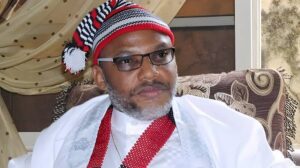Court Admits DSS Report Linking Nnamdi Kanu to #EndSARS Violence, Deaths of Security Officers
 A Federal High Court sitting in Abuja has admitted into evidence a report by the Department of State Services (DSS) alleging that Nnamdi Kanu, leader of the proscribed Indigenous People of Biafra (IPOB), incited violent attacks that led to the killing of 186 police officers and the destruction of over 160 police stations during the #EndSARS protests.
A Federal High Court sitting in Abuja has admitted into evidence a report by the Department of State Services (DSS) alleging that Nnamdi Kanu, leader of the proscribed Indigenous People of Biafra (IPOB), incited violent attacks that led to the killing of 186 police officers and the destruction of over 160 police stations during the #EndSARS protests.
The presiding judge, Justice James Omotoso, accepted the report on Thursday during the ongoing trial of Kanu for terrorism. The evidence was tendered by lead prosecuting counsel, Adegboyega Awomolo, SAN, through the fifth prosecution witness, a DSS operative identified only as “Mr EEE” for security reasons.
READ ALSO: Notorious Gang Leader Nabbed as Lagos Police Recover Dangerous Weapons
Testifying before the court, the witness said he was part of an intelligence unit dispatched to the South-East and other flashpoints across the country during the protests to gather evidence on attacks targeting public institutions and personnel.
“I never met the defendant in person; I only know him through media reports,” the operative told the court, adding that his role was focused on collecting records of the destruction and fatalities allegedly linked to Kanu’s inflammatory broadcasts.
According to the DSS operative, the protests—originally sparked by anger over police brutality—were “hijacked by subversive forces” and led to the death of 186 police personnel, 37 military officers, and 10 DSS operatives. He said 164 police stations and nine offices belonging to the Independent National Electoral Commission (INEC) were also destroyed across 17 states, including Lagos, Abia, Anambra, Delta, Ebonyi, and Cross River.
Included in the evidence were damage reports, death certificates of affected officers, and a compliance certificate—all submitted by Awomolo despite objections from the defence team. The court deferred ruling on the admissibility arguments to a later date.
During cross-examination, Kanu’s lead counsel, Dr. Onyechi Ikpeazu, SAN, questioned the credibility of the DSS report and the rationale for linking the alleged violence to his client.
“You were not involved in investigating the defendant directly, were you?” Ikpeazu asked.
“No,” the witness responded. “I was assigned to investigate public property damage linked to his statements inciting violence.”
The defence counsel further challenged the objectivity of the investigation, asking whether other notable figures associated with the protest movement—such as activist Aisha Yesufu—were also investigated.
“No. My assignment did not include probing IPOB or other individuals like Aisha Yesufu,” the operative responded, admitting that while the protests had legitimate foundations, certain elements exploited the chaos to attack security institutions.
Pressed further, the witness acknowledged that the voluminous DSS report did not contain any section specifically stating that IPOB was directly responsible for the killings.
“There’s no page that specifically links IPOB to any of the reported deaths. But the assessment connects the violence to statements made by the defendant,” he said.
READ ALSO: Benue Bleeds Again: What’s Fueling the Unending Violence in Nigeria’s Heartland?
Ikpeazu also flagged key deficiencies in the report, including the absence of dated photographs, lack of the witness’s signature, and missing identifiers for deceased persons or medical certifiers. The operative confirmed the report was certified under his supervision but admitted he did not personally sign it.
“You did not sign the report. And none of the images presented contain verifiable timestamps,” Ikpeazu observed, hinting that the compilation may have been done after trial proceedings had already commenced—a claim the witness denied.
As proceedings drew to a close, Awomolo announced that the prosecution had successfully laid out its case and urged the court to take judicial notice. In response, Kanu’s lead defence counsel, Kanu Agabi, SAN, entered a no-case submission, signalling the defence’s position that the prosecution had not established sufficient grounds for conviction.
Justice Omotoso granted both parties 14 days each to file written arguments on the no-case submission and two additional days for replies on points of law.
The case was adjourned to July 18 for adoption of the submissions.




